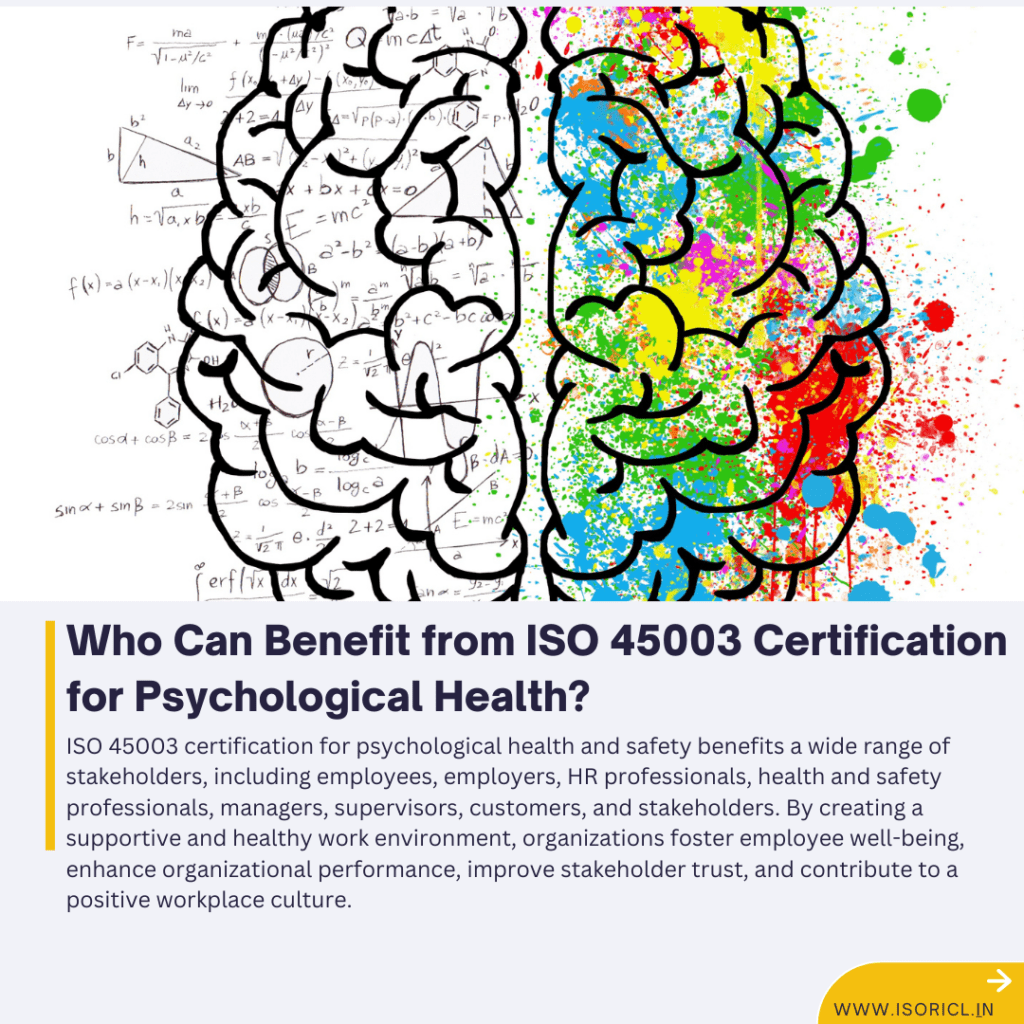Who can benefit from ISO 45003 Certification for psychological health?

ISO 45003 is a standard that provides guidelines for managing psychological health and safety at work. It offers a framework for organizations to proactively address psychosocial risks, promote mental well-being, and prevent harm related to work-related psychological factors. Here’s a breakdown of who can benefit from ISO 45003 Certification:
- Organizations of All Sizes and Sectors
- Employers: Organizations across all industries can benefit from ISO 45003 by implementing practices that promote psychological health and safety in the workplace. This includes addressing stress, bullying, harassment, and other psychosocial risks that can impact employee well-being.
- Small and Medium Enterprises (SMEs): SMEs often face challenges in managing workplace psychological health due to limited resources and expertise. ISO 45003 provides scalable guidelines that SMEs can adapt to their specific needs and operational contexts.
- Human Resources and Occupational Health Professionals
- HR Professionals: Human resources professionals play a critical role in implementing ISO 45003 standards within organizations. They oversee initiatives related to employee well-being, mental health support, training programs, and policy development.
- Occupational Health Practitioners: Occupational health practitioners utilize ISO 45003 guidelines to assess and mitigate psychosocial risks in the workplace. They provide expertise in managing mental health issues, promoting resilience, and facilitating return-to-work programs.
- Employee Representatives and Unions
- Employee Representatives: Representatives from employee groups or unions collaborate with management to advocate for psychological health and safety initiatives. They contribute to the development of policies, participate in risk assessments, and raise awareness among colleagues.
- Health and Safety Committees
- Workplace Committees: Health and safety committees incorporate ISO 45003 principles into their mandates to address psychosocial risks alongside traditional occupational safety concerns. They facilitate communication, monitor implementation progress, and evaluate effectiveness.
- Government Agencies and Regulators
- Regulatory Bodies: Government agencies and regulators use ISO 45003 as a reference for developing policies, guidelines, and regulations related to psychological health and safety in the workplace. They promote compliance with legal requirements and support industry best practices.
- Educational Institutions and Research Organizations
- Educational Institutions: Universities, research institutions, and training providers incorporate ISO 45003 into academic curricula and professional development programs. They educate future professionals and practitioners on managing workplace psychological health.
- Consultants and Service Providers
- Health and Safety Consultants: Consultants specializing in occupational health and safety offer expertise in implementing ISO 45003 standards. They conduct audits, provide training, and offer advisory services to help organizations achieve certification and improve psychological health outcomes.
Conclusion
ISO 45003 Certification benefits a wide range of stakeholders involved in promoting psychological health and safety at work. By adopting ISO 45003 guidelines, organizations enhance employee well-being, reduce absenteeism and turnover, foster a positive work environment, and demonstrate commitment to ethical and responsible business practices. Ultimately, ISO 45003 supports sustainable business performance by prioritizing the psychological health and safety of employees, contributing to organizational resilience and success.

ISO 22000
Food Safety Management System

HACCP
Hazard Analysis and Critical Control Points

FSSC 22000
Food Safety Management Certification Scheme

ISO 22301
Business Continuity Management Systems

ISO 13485
Quality Management For Medical Device

ISO/IEC 27001
Information Security Management System

ISO 20000-1
Information Technology Service Management

ISO 42001
Artificial Intelligence Management System

ISO 41001
Facility Management System

ISO 21001
Educational Organizations Management System

IATF 16949
Quality Management For Automotive

TL 9000
Quality Management System for Telecom

AS 9100
Quality Management for Aerospace Industry

ISO 30000
Ship Recycling Management System

ISO 55001
Asset Management System





